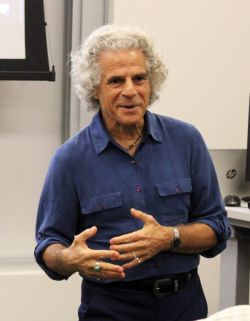About CAPSI: Difference between revisions
No edit summary |
No edit summary |
||
| Line 1: | Line 1: | ||
< | [[File:1 Connecting Close-up.jpg|right|frameless|321x321px]] | ||
<blockquote><i>“Whenever I hear that we need a national dialogue, as in, we need a national dialogue on gun control, police reform, or voter rights, I wonder, where exactly would we have that dialogue? In the newspapers, on social media, in our courts? These venues are ill-suited for </i><i>substantive </i><i>national</i><i>dialogues.”</i><i> '''...''' </i><i>'''Michael Sussman'''</i></blockquote> | |||
'''Too often, industrial sectors operate in fragmented silos''' striving to reach arbitrary and, at times, conflicting goals. Industrial development, consequently, occurs as a series of individual projects instead of whole systems. We must redesign our supply chains to be as efficient and sustainable as possible to survive the threats of climate change. Addressing these challenges requires unprecedented collaboration between all stakeholders within a forum that allows us to build trust and create real action plans. CAPSI convenes stakeholders across all industrial sectors to facilitate whole systems planning for profitable and sustainable industrial systems. We do this through IntelliSynthesis®, our inquiry-based dialogue process within topic-focused IntelliConferences®. | '''Too often, industrial sectors operate in fragmented silos''' striving to reach arbitrary and, at times, conflicting goals. Industrial development, consequently, occurs as a series of individual projects instead of whole systems. We must redesign our supply chains to be as efficient and sustainable as possible to survive the threats of climate change. Addressing these challenges requires unprecedented collaboration between all stakeholders within a forum that allows us to build trust and create real action plans. CAPSI convenes stakeholders across all industrial sectors to facilitate whole systems planning for profitable and sustainable industrial systems. We do this through IntelliSynthesis®, our inquiry-based dialogue process within topic-focused IntelliConferences®. | ||
Revision as of 16:10, 24 October 2024

“Whenever I hear that we need a national dialogue, as in, we need a national dialogue on gun control, police reform, or voter rights, I wonder, where exactly would we have that dialogue? In the newspapers, on social media, in our courts? These venues are ill-suited for substantive nationaldialogues.” ... Michael Sussman
Too often, industrial sectors operate in fragmented silos striving to reach arbitrary and, at times, conflicting goals. Industrial development, consequently, occurs as a series of individual projects instead of whole systems. We must redesign our supply chains to be as efficient and sustainable as possible to survive the threats of climate change. Addressing these challenges requires unprecedented collaboration between all stakeholders within a forum that allows us to build trust and create real action plans. CAPSI convenes stakeholders across all industrial sectors to facilitate whole systems planning for profitable and sustainable industrial systems. We do this through IntelliSynthesis®, our inquiry-based dialogue process within topic-focused IntelliConferences®.
As a society, we aren’t lacking intelligence. What we lack is a communication framework that builds solutions without being derailed by excessive competition, mistrust, or vested interests. Over thirty years as trusted advisors working with thousands of partners from industry, government, academia, and communities, OnTrackNorthAmerica has developed IntelliSynthesis®, a powerful tool for mobilizing the knowledge, intelligence, and goodwill all around us. The more aspects of a system we identify, measure, and consider, the more we turn its interactions into positive synergies. Despite preconceptions, addressing all elements of a system makes it easier to build consensus and develop action plans. New solutions appear that would have otherwise been concealed.
Supply chain shortcomings became public during COVID-19 when goods were stalled at ports and intermodal transfer points for months. The Biden administration responded with a massive public investment in infrastructure. Unfortunately, this precious capital is allotted for individual competing projects while overall system inefficiencies remain. Consequently, we continue to stimulate more highway-centric supply chain activity and underutilize railroads’ energy, space, and capital efficiencies for moving heavy weight over land.
Consider how transportation has typically been planned, or more accurately, not planned. Supply chains have evolved as a chaotic response to shippers’ and developers' indiscriminate land transactions, regardless of the transportation inefficiencies those choices impose. Railroads, ocean carriers, freight forwarders, ports, trucking companies, distributors, and shippers operate in a competitive, and in some cases monopolistic, mode, neither of which allows for the collaboration needed for supply chain efficiency. Creating sustainable, multimodal industrial systems compels us to transition to comprehensive supply chain, land use, and transportation planning.
Yes, a profound shift is needed. If not transformed, this mistrust will cost us and our children the chance of a sustainable, prosperous future. Fortunately, when we approach conversations openly and acceptingly, we inspire trust and cooperation in others. In co-creating CAPSI, stakeholders envision, articulate, and commit to shared principles, protocols, and desired outcomes. When people shift from a competitive to a collaborative mindset, they create policies, programs, and commercial opportunities that serve the collective good. As individuals, we can only go so far; together, we will reach our highest potential by tapping into our collective intelligence.
“These are powerful ambitions. Thankfully, we now have the tools to produce action plans for success. Time is of the essence. We live in a critical moment of potential environmental collapse alongside the need to expand economic vitality to more people. Redesigning industrial systems will deliver both environmental and economic sustainability. Join us in CAPSI for a brighter future!” ... Michael Sussman